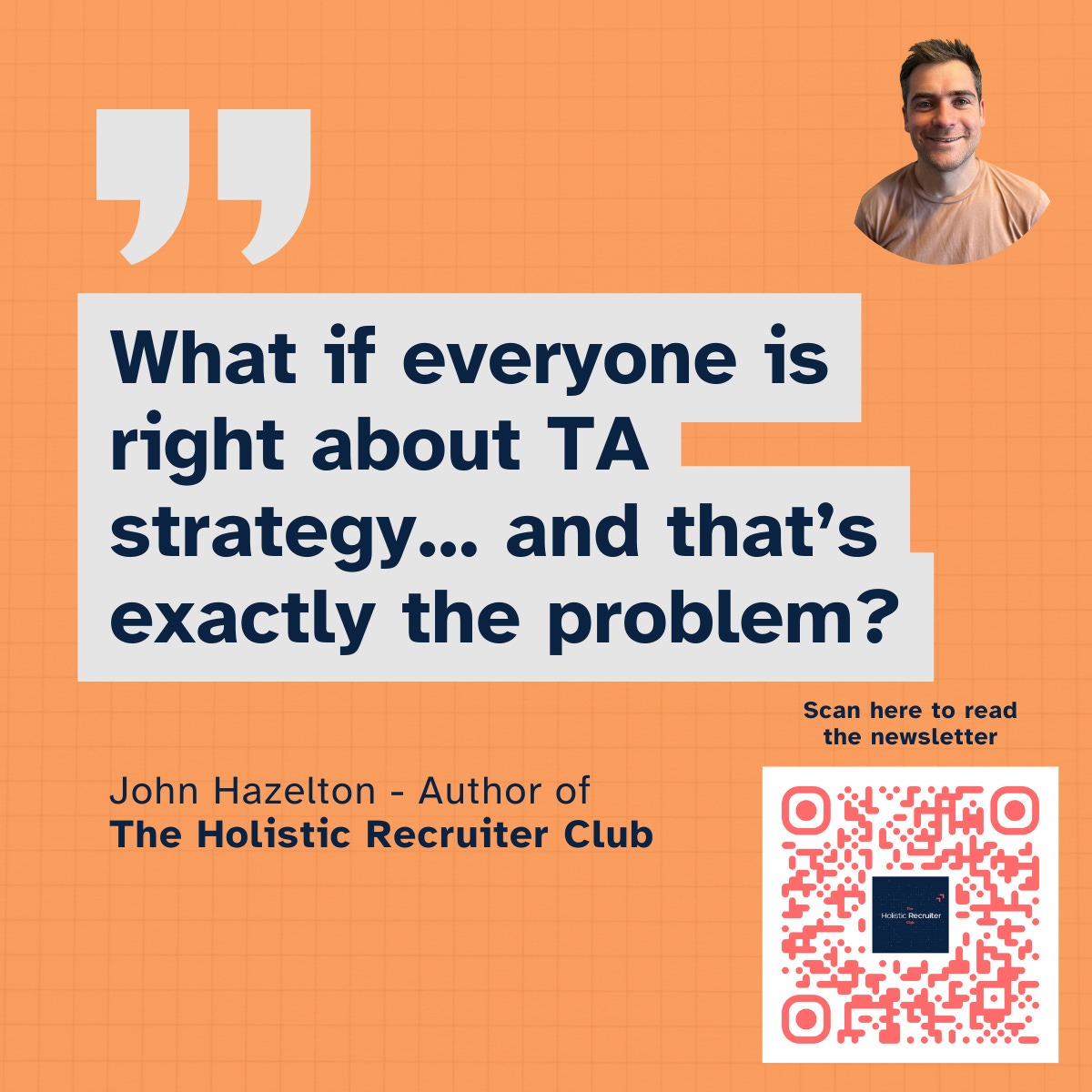Everyone’s Right About TA Strategy & That’s Exactly Why It’s Broken
This week in the Holistic Recruiter Club #036
Hello you lovely people, here’s a bit of a reintroduction for the 61 new Holistic Recruiters who subscribed since the last post! Thank you for subscribing, and welcome!
I’m John Hazelton. Englishman, Essex boy, married to a wonderful French woman, now living in the French countryside with two kids, a vegetable patch, and a dog named George who’s doing his best to destroy it. As you will learn the more you read these articles.
I’ve spent 18 years in HR, Talent Acquisition and. building businesses, and these days I help companies build better hiring systems, through data audits, dashboards, training, and culture work. I’m also building an online training series to go deeper on the themes in these articles. I need your input though please.
Oh, and I ran my first official 5km race last week—26th out of 108, I was pretty happy with that. So i ran 10km on Tuesday and now I’m paying for it I’m getting so old.
Now onto the good stuff…
So here is the Follow-Up No One Asked For (But Everyone Contributed To ; ) )
What If We’re All Right And Also Still Losing At The Same Time)?
Last week, I dropped a grenade on LinkedIn
“What if TA was never meant to be strategic?”
And… boom.
Over 70 comments. So many DMs promise I will respond if I haven’t already!
Many people disagree. Which is what is needed! We do miss this healthy challenge in TA these days! So this was much welcomed!
But what stood out to me most wasn’t the energy around this topic, no no no
Like being in the matrix, I saw a pattern. And not AI, me, John Hazelton! And let’s be honest any anyone else who read the comments too haha
Everyone and I mean everyone, whether they were “pro strategy” or “pro operations” can back to the same think, which was wrestling with the same core emotion,n look at this
As Kevin James Seay put it:
“The idea that operational impact is somehow ‘beneath’ strategy is something I have never fully understood.”
and
said“TA leaders can either influence and drive the change, or have the reinvention done to them.”
This leads me to the conclusion that
TA feels disrespected. Undervalued. Misunderstood.
Even the most strategic voices were still defending why they “deserve the seat”
That in itself was very revealing.
I wrote the question in the way I did, to stir the pot & it worked
Yes, to those of you who called me out on the headline being provocative - it was on purpose.
I wanted to poke the bear stir the pot or whatever, because I don’t think “Should TA be strategic?” is the right question.
The better question is:
What kind of strategy can TA realistically own, right now?
And more importantly:
What earns that right in the first place?
Let's Say What We See
“We’re All Looking Through Different Lenses”
As
rightly called out, what she saw, “Talent Acquisition is fundamentally about finding the right people to fill roles in the most efficient way.” Big disagree. That’s just the operational bit.
It was a fair challenge. And it reminded me how much this conversation shifts depending on where you sit in the system.
Enterprise
You’ve probably got a rec ops, talent intelligence, budget, tooling teams, HRBP alignment, proper Clunky One Size Fits all Tools. Think of Workday ATS without being sick.
TA strategy to your probably means workforce planning, headcount forecasting, and even succession planning.
Some teams have full blown corporate espionage units (okay, maybe not officially). haha
Startups and Scaleups…
You’ve maybe five roles today 200 the next to fill, three people to do it, and a calendar full of screening calls.
All the hottest start up tools. No good data. No buy-in from management
For you stratgey means you want a seat at the big table. But no buy in or credibility to do so.
SMB’s
Hiring is consistent and calm, with occasional bursts but generally consistent and calm.
Your team is most likley expected to be efficient and invisible just deliver when needed.
And just do and don’t break what’s working.
So we’re talking about the same function, in massively different contexts.
That’s why the debate gets messy.
The fact that Nobody agrees on what “Talent Acquisition” actually covers is also confusing.
So if we summarise
For some of us, it’s just recruiting.
For others, it includes RecOps, Talent Intelligence, EB, and even onboarding and in fact a lot more other things.
So no wonder we’re not aligned on strategy, we’re not even aligned on scope.
But let’s back up a minute….
This is the holistic recruiter, so let’s borrow something from some smart people at Oxford and INSEAD teach.
It’s called the 3 Levels of Strategy Model.
We can almost park Corporate strategy but for clarity, think new markets, acquisitions, business unit expansion. TA very rarely has a role here, unless you’re recruiting top level executive in in PE backed companies.
So lets start where TA often gets stuck
For me Functional strategy can work in things for TA’s:
Building a sourcing model
Creating interview scorecards
Better job intake meetings to be sure there is alignment for the needs and process.
Business strategy looks like:
Influencing org design and workforce planning
Helping with identifying growth markets and talent investment
Owning the headcount strategy with the CFO
Both are valid and true, but they’re not the same.
And if you’re skipping functional strategy to reach business strategy, you’re building shitty foundations. That will mean the system you are building won’t scale and will collapse, or you will burn out trying.
My Number 1 Takeaway Is
”Operational Excellence Comes First You CANNOT BE more than functionally strategic until you reach operational excellence. “
Some will argue this and that’s ok but I am looking at this through a real world lens.
Most TA teams aren’t set up to shape business strategy.
They just don’t they don’t have everything they need to be.
They’re being asked to “act strategically” in a system that’s still broken at the process level.
So here’s where I stand :
You don’t get strategic influence without operational credibility first.
Bascially if we are talking very bluntly don’t talk strategy if your basics are still a mess.
Let me introduce and bastardise OODA Loops, for you
I mentioned this in one of my comments and I don’t like to talk to much in about it in pubilic too much as I would say i’m very far from an expert but i’m on a learning journey with this one.
Its one of the most useful models I keep coming back to is the OODA loop from military strategy that Ben Ford introduced me to (listen to our podcast episode here):
Observe (what’s actually happening)
Orient (what does it mean in context)
Decide (based on data)
Act (and adjust fast)
And the point is a loop as you keep repeating this process
Most TA teams are stuck jumping straight to “Decide/Act” without observing or orienting.
So build in many feedback loops and listen to your TA”s on the front line often they will articulate something before the data tells you . It starts by listening, really listening, to your system. But if your system is shite you’re in trouble.
STOP A MINUTE AND THINK
Just making sure you’re still paying attention ;)
So.. now ask yourself…
What’s slowing you down?
What’s being ignored?
What do hiring managers actually trust you to do?
Answer that, and you start earning influence the hard way and the right way by solving real problems.
So… Where are you going with this John? What Does All This Mean?
That’s what I want to explore next.
There’s clearly a gap between where we want to be and reality.
So I’ve started coming up with something I’m calling:
“The Talent Acquisition Strategy Model v1”
If you want to get involved, pop me a message directly
It will aim to map TA’s influence by context, maturity, and operations.
It will be rough. And I’ll share the first version soon.
What do YOU think should be in it?
Hopefully you will come with me. I might even put on a live webinar to co build on what I start. Would you be up for that?
Reply, comment, message me.
Because I am as you are, tired of TA being seen as the order-takers.
Thank you for reading and for your support!









Really smart one - turning a controversial post into a newsletter for deeper dive. Me Like. Me Steal 😂💪🏻